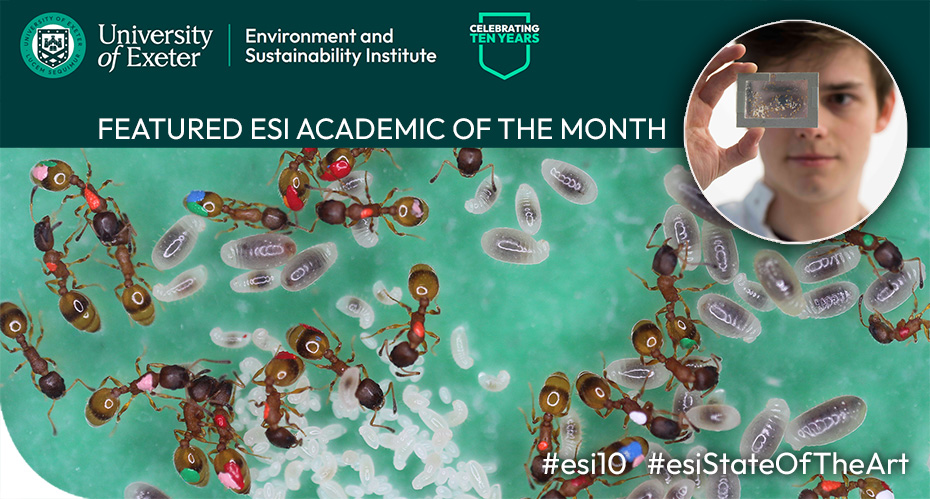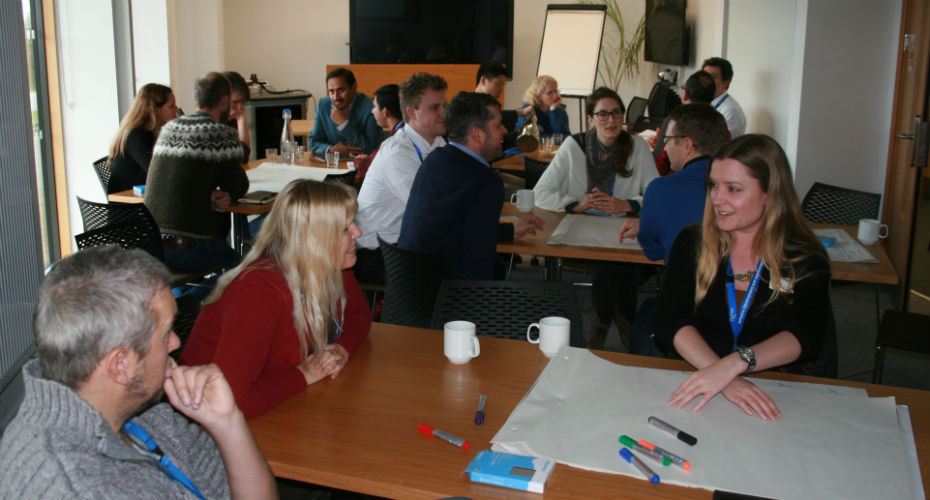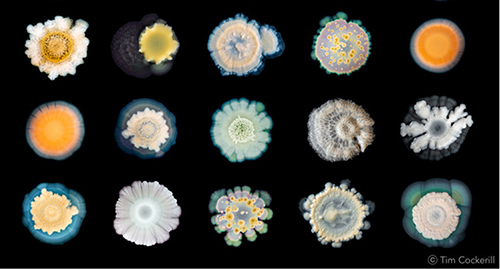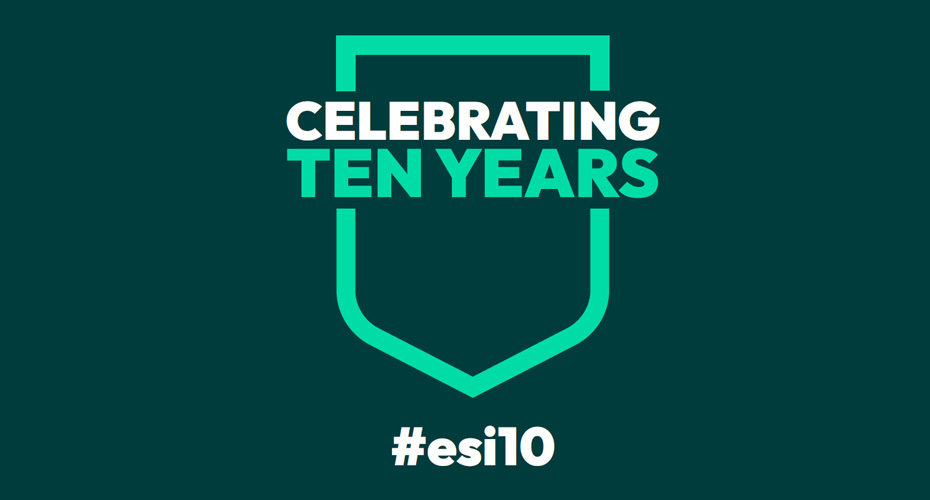
View our #esiStateOfTheArt talks by the Featured ESI Academic of the Month

View our Think Tank events
Select Past events
Past events
Systems mapping in sustainable food and agriculture: practices and challenges
Monday 30 October 2023
This event was organised by the University of Exeter Business School and the Environment and Sustainability Institute, Penryn Campus. The talk was delivered by Domenico Dentoni (Professor in Business, Resilience and Transformation and Co-Director of the Communication and Organizing for Sustainable Transformations (COAST) at Montpellier Business School), prepared with Diana Borniotto (Université catholique de Louvain) and Marija Roglic (Montpellier Business School).
The Cornish Devolution Debate
Monday 6 February 2023
Cornwall has the offer of a new Devolution Deal, which comes with the condition of having an elected Mayor. The people of Cornwall are now deciding if this is what we want, and to help us make up our minds, the University of Exeter's Institute of Cornish Studies is teaming up with the Environment and Sustainability Institute, and the Political Studies Association Local Politics and Governance Specialist Group to host a hybrid event. This will bring together organisations from Cornwall - academics and policy practitioners with experience of City Region/Combined Authority Mayors and local political leaders - to make for a lively and informed debate.
Building Academic-Industry Relationships workshop: Microbiology Research Community

Wednesday 8 June 2022
The microbiology research community in Cornwall has a wealth of knowledge and expertise across various major sectors that could be leveraged in partnership with industry. These research strengths have the potential to benefit sectors such as agriculture, health, energy, and mining. This was one of the key takeaways from the “Building Academic-Industry Relationships workshop” that was held at the ESI on June 8, 2022.
The workshop, which was attended by around 20 researchers at various career stages, was led by consultants from Oxentia and was supported by Innovation, Impact, and Business (IIB) colleagues. The goal of the workshop was to map key microbiology research strengths in order to build and strengthen partnerships with industry.
One of the main motivators for partnering with industry is to drive impact, but the workshop participants discovered that support is needed to align with industry motivations in order to ensure successful engagement and collaboration. The workshop examined drivers for industry collaboration, which included societal impact, funding and diversification of income, new career opportunities, upskilling, and curiosity. It mapped research strengths within microbiology to food production, antimicrobial resistance and the environment, biogas, waste treatment, and mining, as well as microbes for health and disease.
Amongst several key strengths that could support industry engagement, the workshop identified:
- Optimizing natural processes to improve agricultural sustainability
- Developing a leading understanding of the emergence and control of antimicrobial resistance in the environment
- Manipulating natural microbial communities to reduce the impact of industrial processes.
The panel discussions acknowledged that industrial relationships would have an indirect value in terms of resulting networks for future research opportunities as well as insights into how research is translated and utilized. Additionally, they would be a great way for early career researchers to differentiate themselves and gain traction with research funding beyond conventional sources.
The workshop highlighted that researchers would benefit from more support in identifying, approaching, and engaging industrial partners. The outputs of the workshop will help inform external marketing efforts aimed at engaging industry collaborators.
Thanks to Oxentia for hosting the workshop. For more information on how IIB can support Mircobiology research or lead similar workshops, please contact Puja Thiel, Environmental Bioeconomy sector lead at IIB.
Net zero: fact, theory and wishful thinking
Thursday 31 March 2022
An end-of-term event for the students on the ESI led Masters programmes.
Net zero has rapidly become a central element in the discourse around human-caused climate change mitigation. National and regional governments along with communities and corporations have declared climate emergencies in which net zero by a specific date features prominently.
In this talk Dr James Dyke gave a brief overview of the emergence of net zero and its current role in climate change mitigation. He argued that while motivated by concerns of climate justice and equity, net zero has become co-opted to facilitate a burn now - pay later approach which threatens to overwhelm younger people and future generations with vast economic and technological debts.
Arts, Culture and the Environment in Cornwall
Wednesday 21 July 2021
An ESI event in collaboration with Penryn Humanities and Exeter Arts & Culture.
This event offered a cross-campus format for sharing research and emergent ideas, to give an audience (of non-specialists) a broad impression of active work, including its significance, methods and insights. It showcased our interdisciplinary work in Cornwall, in a way that hopefully provokes playful, dynamic and ongoing interactions.
Banking on a Just Transition: Why small is beautiful and money is mutual
Thursday 4 February 2021
An ESI event with Tony Greenham, CEO of South West Mutual
An ill-fated advertising campaign by Barclays Bank in 2000 proclaimed the virtues of being big, at the same time that rural branches were being slashed, and the CEO was enjoying a massive pay rise. Eight years later, Barclays was days from collapse during the global financial crisis and implicated in various mis-selling scandals. Over the past few years, 4 of the top 5 UK banks have continued pouring over £50bn a year into fossil fuels. If the challenge of our time is a socially just transition to a net zero society - what kind of bank is best suited to that purpose? South West Mutual is seeking to establish the region’s first purpose-led mutual bank. Join us to discuss why money is a social relationship, not a commodity, and why smaller banks can serve the parts of the economy that big banks cannot reach.
PechaKucha sessions
Wednesday 20 and 27 January 2021
The two online research PechaKucha sessions, by The Environment and Sustainability Institute (ESI) and Institute of Cornish Studies (Fondyans Studhyansow Kernewek), both based in Cornwall, are hosted by Steffen Boehm.
“PechaKucha is a storytelling format where a presenter shows 20 slides for 20 seconds of commentary each (6 minutes and 40 seconds total)”
The idea is to provide a quick but interesting overview of a research project so that the audience (of non-specialists) get a broad impression of the research, its importance, significance, research methods and knowledge insights. These sessions are designed to aid the communication of research at the Cornwall campuses of the University of Exeter. There is so much going on in terms of excellent, interdisciplinary research in Cornwall, it’s difficult to keep up, yet essential if we want to build interdisciplinary research teams and teach our students about interdisciplinary research agendas.
(Video above) PechaKucha Session I on 20 January
Click here to watch PechaKucha Session II on 27 January.
Peripheral Vision: Reimagining Regional Policy for a Greener Union
Wednesday 16 December 2020
Organised by Britain's Leading Edge and the Environment and Sustainability Institute.
Chaired by Jonathan Werran from Localis, Stuart Dawley and Gail Mulvey talked about regional development for the periphery, Ian Bateman and Jennifer Geroni outlined the concept of natural capital and how it can be used to reframe the potential for regional development, Arianna Giovannini and Mark Sandford considered the link to the ongoing debate about devolution, and Jessie Hamshar and Jason Torrance applied the conference themes to developments in local government and policy/ practice.
(Video above) Session I: Peripheral Development
Dr Stuart Dawley, Newcastle University
Dr Gail Mulvey, University of Cumbria
Click here to see Session II: Natural Capital
Professor Ian Bateman, University of Exeter
Dr Jennifer Geroni, Environment Platform Wales
Click here to see Session III: Governance and policy responses
Dr Arianna Giovannini, De Montfort University
Dr Mark Sandford, Senior Researcher, House of Commons
Click here to see Session IV: Britain’s Leading Edge
Jessie Hamshar, Director of Strategy and Engagement, Cornwall Council
Jason Torrance, Policy Director, UK100 / Countryside Climate Network
Information Exchange: How can we create a wilder Cornwall?
An ESI event with Cornwall Wildlife Trust.
Thursday 3 December 2020
Cornwall Wildlife Trust’s Chief Executive and key Managers would like to share information about the work they are doing to reverse the decline of nature, to tackle climate change and to inspire people to take action for nature in Cornwall. They’d like to hear your ideas on how your research and studies could help too. Join this interactive session to explore how academia and the voluntary sector can collaborate with others to create a wilder Cornwall.
Natural Capitals on the Duchy of Cornwall farms
An opportunity to discuss how we can collaborate to co-design a science-based research and monitoring programme
Thursday 22 October 2020
The Duchy of Cornwall’s Natural Capital Project has at its core the ambition to cherish, protect and enhance the environment for future generations.
Across its 130,000 acres of upland and lowland farmland and forests the Duchy is establishing a database that will provide a unique baseline assessment of seven key natural capital elements, namely soils, water and air quality, biodiversity, historic interest, recreation and access and landscape.
Based on these assessments, integrated farm plans will be drawn up to not only safeguard existing features but also to provide ambitious enhancements on each farm and at scale across the estate as a whole.
The Duchy of Cornwall is establishing several demonstration farms (called Focus Farms) where it can develop its more detailed understanding, not only of the costs and benefits (monetary and non-monetary) of the ecosystem services of this work but also where research can be pioneered and developed to help inform its future assessments.
To this end, the Duchy wishes to collaborate with Exeter University to explore a science-led programme for the monitoring of its natural capital assets. It is hoped that this work will provide opportunities for research students to collaborate to develop a multi-disciplinary programme which establishes high quality and cutting-edge methods of natural capital assessment and monitoring.
Lagas: An Environmental Intelligence Platform for Cornwall
4th June 2020
Lagas is the environmental intelligence platform developed though Tevi to explore Cornwall’s natural environment. The aim of this event is to explore the potential applications for Lagas from the academic community, focused on the ESI, and to demonstrate the functionality of the platform as a key tool for the effective communication of environmental data.

